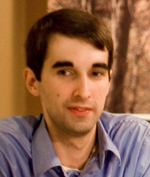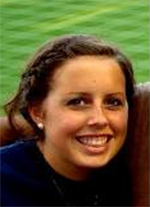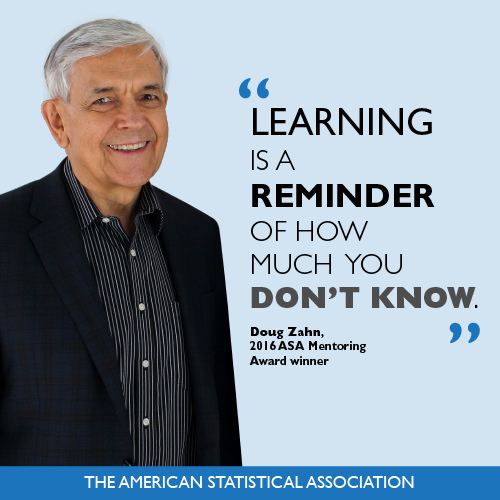The article appeared in the first STATtr@k column in Amstat News the membership magazine of the American Statistical Association. Featured here are two personal accounts written by recent statistics graduates. First, Andrew Cron, a second-year PhD student in statistical science at Duke University, discovers how taking risks can lead to success. Then, Gabrielle Rossetti, a student at Simmons College, talks candidly about her internship experience at the Energy Information Administration.
 Andrew Cron,
Andrew Cron,
a second-year PhD student in statistical science at Duke University, discovers how taking risks can lead to success.
I love statistics because of the vast array of problems that can be addressed using a probabilistic approach. Whether it’s cellular biology, finance, or product improvements in industry, there are always completely new areas in which to dive. However, the academic and professional experiences are not just about getting the job done or getting the grade; they’re about making connections, seeking new challenges, and always learning as much as possible.
I learned these quickly in my career as a statistician. In 2009, I graduated magna cum laude from the University of South Carolina, and I am currently a second-year PhD student in statistical science at Duke University. I’ve worked as a research assistant under Mike West, and I am a coauthor on a paper that has been fast-tracked into the Journal of Computational and Graphical Statistics (JCGS).
My current research is a constant collaboration with biologists to nonparametrically understand dynamical systems using flow cytometry data. We have developed novel computational methods in mixture modeling using graphical processing units. I also am actively involved in consulting and will continue to seek new problems and experiences.
My desire to learn and gain experience has brought me to where I am today. When I finished high school, I didn’t know what I wanted out of college. I applied to a local school, the University of South Carolina, because it offered a variety of programs and a good funding package. To pass the summer, I took a job with the Research and Development Center at Michelin North America. I started working with the maintenance department and, by the end of the summer, I had developed a database management system for Michelin’s internal training school. The connections I made that summer became the foundation for my career.
I learned my most important lesson as a young worker: Be open to new experiences and never say “no.” I kept this in mind as I began the first semester of my undergraduate program. I claimed a double major in math and business in hopes of finding a good job upon graduation, but I quickly found much more. In my first semester, I took a calculus-based probability course with Joshua Tebbs. His course completely altered my career path and showed me how many interesting problems can be addressed with probability and statistics. After doing some reading and meeting with Tebbs, I changed my major to math and statistics.
The statistics department at the University of South Carolina provided an excellent group of advisers and teachers who helped me grow as a statistician; however, only a small portion of this growth came from the classroom. The time I spent in professors’ offices, asking deeper questions, enhanced my appetite for learning. I actively attended seminars and began to learn about new statistical methods on my own. An introductory lecture on Bayesian statistics sparked my interest, and I quickly delved into as much Bayesian statistics literature as I could find. The Bayesian approach answered many of the questions that baffled me with reasonable, probabilistic approaches.
After three years of undergraduate work, I graduated magna cum laude. I didn’t have the job I expected; I had instead found a passion. This was a trend throughout my college career. I had entered thinking I would take courses, get a degree, and find a job. Instead, I gained a passion for learning and discovering new things. I embraced my “never say no” philosophy and was constantly exposed to and challenged by new ideas.
I am grateful for the several mentors who poured into me as I began my studies. Solid mentors and advisers are the key to success in any stage; always look for them. Mine provided me an outstanding learning environment and advised me as I explored aspects of statistics. My mentors helped ensure that most of my college expectations were well exceeded. I do wish, however, that I had become more actively involved in research with the university.
I made up for my lack of university research experience through continued internships with Michelin North America’s Research and Development Center. I was able to use these experiences to supplement my learning. I learned to think in terms of goals: What do I want, and how am I going to achieve it? In contrast to college, company internships pressed me to learn quickly and implement immediately. It was an exciting experience in which I thrived. Learning was at the core of my work, and I acquired knowledge for a specific goal.
During my internships, I took advantage of every opportunity to meet someone new and learn from the people with whom I worked. Experienced professionals surrounded me, and I gained as much information as I could from them. These people not only enhanced my personal growth, but they also helped open doors to new opportunities within the company. I returned to the company every summer until graduation, and I still keep in touch with the people I met there.
My work at Michelin also offered several viewpoints into the inner workings of a company. I was able to create much-needed tools for managers and designers, and I gained valuable skills as I learned to present these tools to them.
I also saw how research works in industry. My learning experience in industry was just as valuable as college. Michelin North America gave me the opportunity to meet great professionals, explore new ideas, and contribute to a greater purpose. I sometimes wish I had sought more varied research opportunities, but I know I was fortunate to work in a company that gave me such a diverse experience. In fact, it was my last summer internship at Michelin that was most influential in setting my current path.
That last summer, I worked for the company’s head statistician. I was able to research new Bayesian methodology and investigate the advantages of using Bayesian logistic regression to stabilize the estimates in rare event cases. This experience enhanced my passion for the methodology I had explored in school, and I decided to pursue it in graduate school.
During the application process, I was again struck by the value of my mentors. They took a personal interest in me and helped ensure I would be accepted to a school with the best fit. For me, this was Duke University. I had become completely engrossed in Bayesian statistics, and the department at Duke University is comprised of several leading experts in the field. I was accepted and originally employed as a teaching assistant; however, a conversation with West about using graphics processors to obtain incredible computational speed quickly led me to a research assistantship. Our endeavors over the first year resulted in a publication in JCGS.
We are currently developing methodology to harness new statistical and computational methods to address label switching in mixture models and investigate more complex biological systems. As I continue my studies, my excitement for statistics grows. My graduate work has shown me new and interesting ways to address modern problems. Duke University has been a great place to do research, and my experiences here have been the best in my career. Everything I enjoyed about my undergraduate work is amplified in graduate school, and I get to do it all the time.
I know I have studied statistics for a relatively short time, but I’ve had the opportunity to connect with experts. I constantly strive to surround myself with mentors and colleagues. These are the people who will lead you to new experiences, and those experiences will flow into even more exciting experiences.
If you are not trying to do something you have never done before, I encourage you to reconsider. To me, what is most exciting about statistics is that there are so many applications. I can always learn more. Trust in your ability to learn and never stop.
Nuclear Engineering to Ultimate Frisbee
A Conversation with an Intern at the Energy Information Administration
 Gabrielle Rossetti, a student at Simmons College, talks candidly about her internship experience at the Energy Information Administration.
Gabrielle Rossetti, a student at Simmons College, talks candidly about her internship experience at the Energy Information Administration.
Gabrielle Rossetti (GR), a student at Simmons College, served as a JPSM intern at the Energy Information Administration (EIA) during the summer of 2010. In this conversation with Janice Lent (JL), a mathematical statistician at EIA, Rossetti talks candidly about her internship experience and how it helped shape her plans for the future.
JL: Gabrielle, tell us a little about you.
GR: I am from the northeast corner of Connecticut and attend Simmons College in Boston, Massachusetts. I will graduate in May with a bachelor’s degree in economics and financial math and a minor in statistics.
I really love college and have tried to make the most of my experience in Boston. I’ve been a resident adviser for two years and will serve as a senior resident adviser when I go back to school in the fall. I am passionate about campus vibrancy and have been lucky enough to serve as class president all four years of college.
I am also a mentor with Strong Women, Strong Girls, a nonprofit driven to empower inner city girls in the third to fifth grades to become leaders. When I’m not learning, I like exploring, working out, spending time with my family and friends, and dancing.
JL: Why did you decide to pursue a JPSM internship this summer?
GR: I knew that I wanted to land an internship this summer. Luckily, I saw a JPSM poster on my professor’s office door. The poster was enticing: a paid internship for me to do statistics all summer in Washington, DC, a city I had never explored. How could I possibly pass up an opportunity like that? I liked how the poster explained that the people who understand statistics—who can talk and write about the numbers—are the ones who help shape our world.
Last summer, I did a six-week internship at Boston University’s Summer Institute for Training in Biostatistics and I really liked applying the concepts I had learned in my statistics class to real-world applications. I also formed strong relationships with the people in the program. I had a feeling that the JPSM program would give me an even broader experience with statistics and I liked the idea of meeting new people. I also really liked that I would be able to visit all of the federal statistical agencies. Getting the JPSM internship became an overarching goal for me last year—it was the one thing that I had to get.
JL: Why did you decide to accept an internship at the Energy Information Administration (EIA)?
GR: When I applied to JPSM, I wrote about my passion for education statistics and financial literacy. I initially thought my internship would be at an agency focused on those topics. When EIA offered me an internship, I will admit I was surprised; I had never thought of a career in energy. Nevertheless, I thrive on learning new things and the offer from EIA was appealing because I knew I would have the opportunity to delve into a completely new world—the world of energy.
JL: What aspects of the JPSM internship have been most valuable to you in achieving your goals for the summer?
GR: I have been able to work on projects with many different colleagues in my group. This has enabled me to establish professional relationships. Through JPSM, I’ve also visited other federal statistical agencies. It has been helpful learning about different career paths and work experiences of federal employees. The other interns in JPSM have also played an important role in helping me achieve my goals this summer.
JL: What aspects of working at EIA have you found most valuable?
GR: EIA really takes an interest in their interns. Through the EIA weekly intern briefings, I’ve learned about the work of all the divisions in EIA and the different surveys they conduct. It complements what I’m learning about survey methodology through JPSM. We also get to go on field trips. For example, it was fascinating to see first-hand how they create electricity from solid waste when we visited a waste energy plant.
I also like the openness of EIA. I feel like I can stop and talk to anyone in the hall. It also seems like everyone at EIA really likes his or her job.
JL: How would you describe the work environment in the EIA Statistics and Methods Group (SMG)?
GR: My first week here, I realized that it was like a family. Everyone is really focused on their work, but they don’t mind stopping to help someone else. There’s a strong sense of teamwork and professional collegiality. One thing that really struck me was the fact that an SMG staff member had cancer and the others were sending cards and going to visit her. I knew they were all thinking about her. There’s a real sense of connection here.
JL: Do you think your experience this summer will influence your academic and career choices in the future?
GR: Definitely. I’ve been taking Chinese for two years, and two people in this office speak Chinese. I’ve been able to talk to them about a possible trip to China. I think I’ll apply for a Fulbright scholarship to teach English in China, but after that, I think I’d like to come back and work at EIA. I’ve developed an interest in nuclear engineering, for one thing. At EIA, there’s a lot of flexibility to move around and explore new fields.
I also like the culture of EIA. I feel like I’ll be able to move up here, not just in terms of salary, but also in terms of my intellectual capabilities. Everyone here is always learning, and there is a lot of support for learning. It is similar to an academic environment in that sense.
JL: What advice would you give to students who are considering applying for a JPSM internship?
GR: Do it! I can honestly say this has been one of my best summers. The mixture of work, academic, and social life has been great. I have my weekends free to explore Washington and have fun with the other JPSM interns. I have free housing at GWU and I’m making money. It’s the perfect summer.
JL: What guidance would you give to a student just beginning a JPSM internship?
GR: Ask questions and be willing to take on everything. Delve into the experience and go beyond your comfort zone. Explore a completely new field that you’ve never thought about before and don’t be afraid you won’t know everything—because you won’t.
Also, be willing to make new friends. There are so many opportunities for you to meet people—an ultimate Frisbee team, a happy hour group, organized trips to the Nationals and DC United, planned lunches, and so much more.
Last, take advantage of your time in Washington, DC. Go to the free concerts at the Capitol, visit the Smithsonian museums, try new foods, run along the Potomac, explore!




Leave a Reply